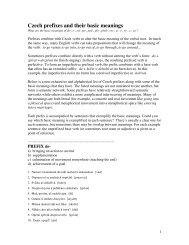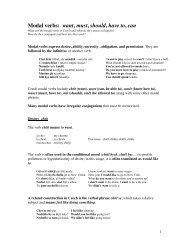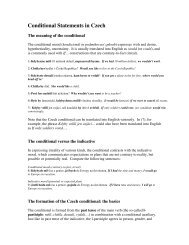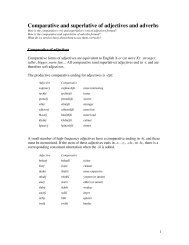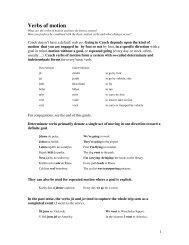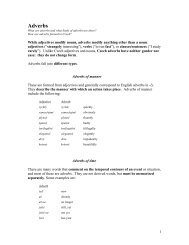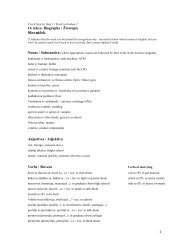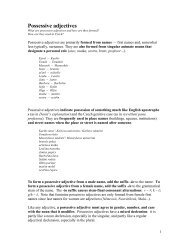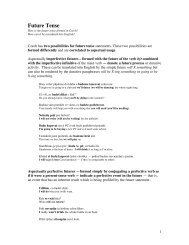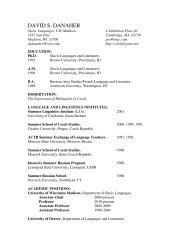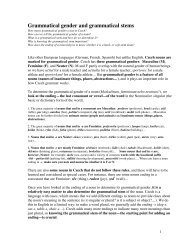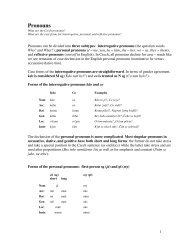Verbs: the present tense - Cokdybysme.net
Verbs: the present tense - Cokdybysme.net
Verbs: the present tense - Cokdybysme.net
You also want an ePaper? Increase the reach of your titles
YUMPU automatically turns print PDFs into web optimized ePapers that Google loves.
Bydlíš na koleji nebo v bytě<br />
in dorms or apartment<br />
verb: bydlet<br />
100 filmů, které musíte před smrtí vidět. verb: muset<br />
which before death<br />
Some verbs in -et fall into a subtype with one variant ending: <strong>the</strong> third-person plural form<br />
ends in -ejí or -ějí. <strong>Verbs</strong> in this subtype in standard Czech include umět (to know how to),<br />
rozumět (to understand), and prefixed verbs of motion like přicházet (to come or arrive) and<br />
odcházet (to go away or leave).<br />
Proč neumějí plavat<br />
why to-swim<br />
Češi penězům nerozumějí.<br />
Czechs money<br />
Přicházejí problémy.<br />
Studenti odcházejí pracovat do USA.<br />
to-work to<br />
verb: umět<br />
verb: rozumět<br />
verb: přicházet<br />
verb: odcházet<br />
In colloquial Czech, <strong>the</strong>re is some general confusion among <strong>the</strong> endings in <strong>the</strong> third-person<br />
plural for Type II verbs: -í is sometimes used even for <strong>the</strong> subtype and also <strong>the</strong> -ejí/-ějí ending<br />
(often reduced to -ej/-ěj) can be generalized to regular Type II verbs.<br />
-------------------------------------------------------------------------------------------------------------<br />
Type III: -ovat; -uje Endings: -uji (-uju), -uješ, -uje, -ujeme (-ujem), -ujete, ují (-ujou)<br />
já: pracuji (-uju) my: pracujeme (-ujem)<br />
ty: pracuješ vy: pracujete<br />
ona/on: pracuje oni/oni: pracují (-ujou)<br />
This type includes a large number of verbs, including many everyday ones like potřebovat (to<br />
need), studovat (to study), (po)děkovat (to thank), and tancovat (to dance). Many foreign roots<br />
are re<strong>present</strong>ed in this type like analyzovat, prezentovat, and bombardovat. Alternate endings<br />
in colloquial Czech for first-person singular and plural as well as third-person plural are given in<br />
paren<strong>the</strong>ses.<br />
Kolik informace vlastně potřebujeme<br />
how-much really<br />
verb: potřebovat<br />
Ještě studuju ale zároveň i pracuju. verbs: studovat, pracovat<br />
still but at-<strong>the</strong>-same-time<br />
Děkujeme Ti za všechno!<br />
for everything<br />
Jana tancuje převážně rumbu a sambu.<br />
verb: děkovat<br />
verb: tancovat<br />
3



